Research on Schools, Neighborhoods, and Communities
Research on Schools, Neighborhoods, and Communities
Toward Civic Responsibility
William F. Tate IV Editor
Published for the American Educational Research Association
ROWMAN & LITTLEFIELD PUBLISHERS, INC.
Lanham New York Toronto Plymouth, UK
The American Educational Research Association (AERA) publishes books and journals based on the highest standards of professional review to ensure their quality, accuracy, and objectivity. Findings and conclusions in publications are those of the authors and do not reflect the position or policies of the Association, its Council, or its officers.
The AERA Books Editorial Board
Chair: Cherry A. McGee Banks
Members: Gilberto Q. Conchas, Robert E. Floden, Mary M. Juzwik, Felice J. Levine, Gary J. Natriello, Mariana Souto-Manning, Olga M. Welch, and Carol Camp Yeakey
Published for the American Educational Research Association
Published by Rowman & Littlefield Publishers, Inc.
A wholly owned subsidiary of The Rowman & Littlefield Publishing Group, Inc.
4501 Forbes Boulevard, Suite 200, Lanham, Maryland, 20706
http://www.rowman.com
10 Thornbury Road, Plymouth PL6 7PP, United Kingdom
Copyright 2012 by the American Educational Research Association
All rights reserved . No part of this book may be reproduced in any form or by any electronic or mechanical means, including information storage and retrieval systems, without written permission from the publisher, except by a reviewer who may quote passages in a review.
British Library Cataloguing in Publication Information Available
Library of Congress Cataloging-in-Publication Data
Research on schools, neighborhoods, and communities : toward civic responsibility / edited
by William F. Tate IV.
p. cm.
Summary: This volume focuses on research and theoretical developments related to the role of place or geography in matters of education, human development, and health. Multiple disciplinary perspectives are presented in order to provide different views of the strengths and problems in our communities. Research presented provides historical, moral, and scientifically based arguments organized to inform understandings of civic problems as well as to present possible solutions Provided by publisher.
ISBN 978-1-4422-0467-6 (hardback) ISBN 978-1-4422-0468-3 (paper)
ISBN 978-1-4422-0469-0 (electronic)
1. Community and schoolUnited States. 2. Educational sociologyUnited States.
3. Educational equalizationUnited States. I. Tate, William F.
LC221.R47 2012
371.19dc23 2011032848
 The paper used in this publication meets the minimum requirements ofAmerican National Standard for Information SciencesPermanence of Paperfor Printed Library Materials, ANSI/NISO Z39.48-1992.
The paper used in this publication meets the minimum requirements ofAmerican National Standard for Information SciencesPermanence of Paperfor Printed Library Materials, ANSI/NISO Z39.48-1992.
Printed in the United States of America
To the Cash, DeBerry, Jones, Legardy, Tate, and Terrell families, who have passed on their passion for schools and community.
And, as always, to Kimberly, for listening.
Acknowledgments
This book would not have been possible without the support of many people. First, I wish to extend my thanks to all of the authors of the volume. Second, I want to express my thanks to the reviewers for their insightful comments in the various production stages of the book. In particular, I wish to note my appreciation of the contributions and support of Celia Rousseau Anderson, Edna Cash, Linda Cottler, Jay Cummings, Carl Grant, Mark Hogrebe, Korina Jocson, Sheri Notaro, Catherine Striley, Allen R. Sullivan, William F. Tate III, and Daryl Tate. Also, the administrative and technical support of Marilyn Broughton, Natalia Kolk, Li Zou, and Brian Cohen was consistent throughout this project. Keith Griffin provided invaluable editorial assistance.
Many of the chapters in this book were presented during a 2009 conference held at Washington University in St. Louis Americas Urban Infrastructure: Confronting Her Challenges, Embracing Her Opportunities . I am grateful for the tremendous show of support by my colleagues from various programs, departments, centers, and schools at the university including: (1) Center for Regional Competitiveness in Science and Technology, (2) Center on Urban Research & Public Policy, (3) Program in African & African American Studies, (4) Office of Diversity ProgramsSchool of Medicine, (5) Center for the Humanities, (6) Department of Education, (7) George Warren Brown School of Social Work, (8) School of Law, and (9) Office of Diversity Initiatives. I offer my thanks to the leadership of these unitsProfessors John Baugh, Garrett A. Duncan, Gerald Early, Will Ross, and Carol Camp Yeakey as well as Leah Merrifield and Deans Edward Lawlor and Kent Syverud. In addition, Professors Adrienne Davis, Anne Newman, Shanti Parikh, Itai Sened, Vetta L. Sanders Thompson, and Murray Weidenbaum helped in important ways to stimulate feedback for the conference presentations. In addition, Jeannie Oakes of the Ford Foundation provided insightful commentary and responses related to the conference paper presentations. The collective effort was intellectually rich and exciting.
I am thankful that Professor Ronald Walters made a determined effort to deliver his paper at the conference. Professor Walterss death after the conference was both a shock and loss. His contributions to our understanding of politics in the United States are significant.
In addition, I offer a special acknowledgment of gratitude to Chancellor Mark S. Wrighton, Provost Edward S. Macias, and Dean Gary S. Wihl for their support of and participation in the Washington University conference activities. The support I have received from Washington Universitys administration during my tenure as AERA president as well as through the preparation of this book allowed me to complete this project.
I wish to thank Felice J. Levine and Phoebe H. Stevenson for their support before, during, and after the 2008 AERA Annual Conference. In addition, Todd Reitzel displayed a significant level of patience as well as consistent encouragement in his role as AERA director of publications. I thank you, Todd, for the support. I also appreciate the affirming support of Cherry A. Banks, chair of the AERA Books Editorial Board, as well as the other members of the board. My experience as association president gave me a real appreciation for the entire AERA staff as well as the hundreds of colleagues who volunteer their time to serve on the council or the many other roles required to make the organization work well.
Last, but not least, I want to thank my familyKimberly, Quentin, and Cameronfor their support of this project. My experiences with you made this work more relevant.
My research and development has been funded by the National Science Foundation under Award No. ESI-0227619. Any opinions, findings, and conclusions or recommendations expressed here are those of the author and do not necessarily reflect the views of the National Science Foundation.
Introduction
William F. Tate IV
Over 40 years ago, in response to a pressing concern for children living in disadvantaged conditions, Professor Edmond W. Gordon (1970) edited a special issue of Review of Educational Research (RER), a scholarly journal that is a part of the American Educational Research Associations (AERA) publication portfolio. Professor Gordon organized a collection of articles that explored a range of topics including: (1) immigrants and schools, (2) epidemiology and intelligence, (3) disadvantaged rural youth, (4) social class and socialization, (5) desegregation and minority group outcomes, (6) community participation in public education, and (7) school-to-college transitions. He lamented not being able to more directly examine a neglected area of education researchrelationships between school performance and the health status of disadvantaged children. The content and research presented in this special RER issue have greatly informed my thinking about the field of education research in two ways. First, the topics highlighted in the special issue of the journal as well as the relationship between the health status of underserved children and education performance have persisted as public policy concerns (Hochschild & Scovronick, 2003; Irvin, Farmer, Leung, Thompson, & Hutchins, 2010; Mickelson, 2008; Payne, 2008; Tate & Striley, 2010). Second, these areas of concern as well as related processes and their impacts are situated in place, in neighborhoods and communities. However, the importance of geography is often not appropriately examined in education research. William Julius Wilson (1998) argued this very point as part of his call for more research that examines the association of environmental factors and academic achievement:

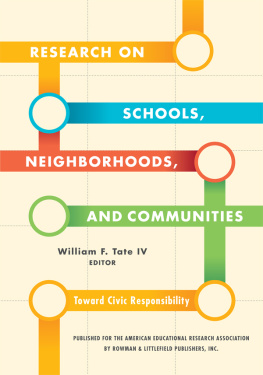

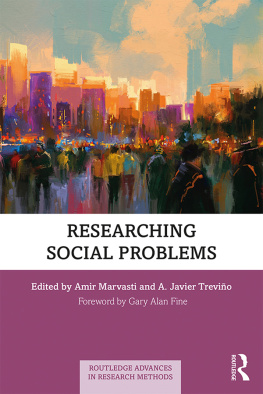
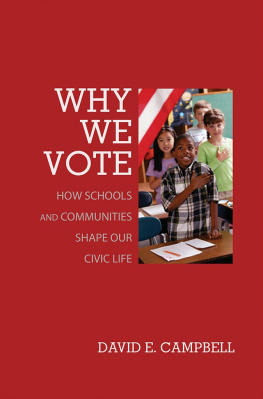

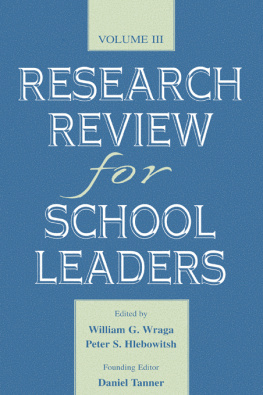
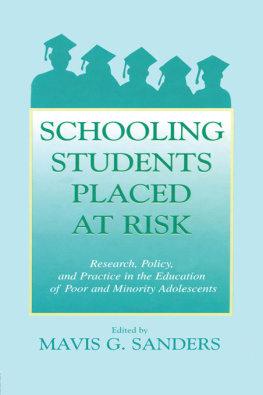
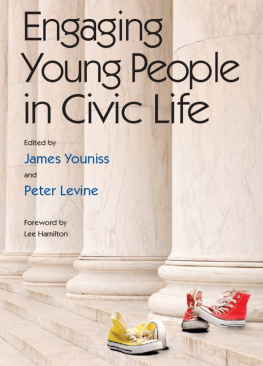
 The paper used in this publication meets the minimum requirements ofAmerican National Standard for Information SciencesPermanence of Paperfor Printed Library Materials, ANSI/NISO Z39.48-1992.
The paper used in this publication meets the minimum requirements ofAmerican National Standard for Information SciencesPermanence of Paperfor Printed Library Materials, ANSI/NISO Z39.48-1992.